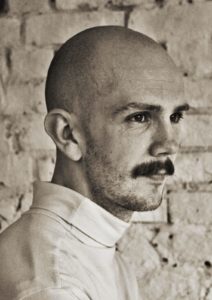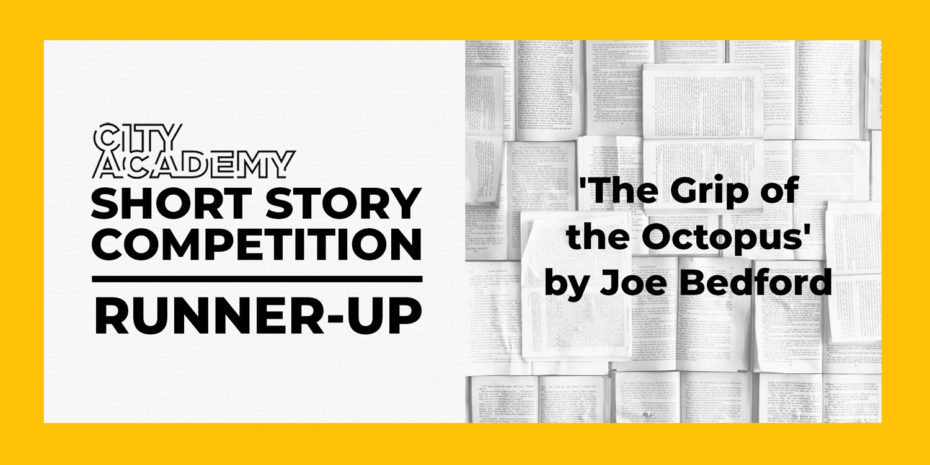'The Grip of the Octopus' was written by Joe Bedford for our City Academy Short Story Competition 2021.
The Grip of the Octopus
Fine, I’ll start again. I murdered the Chinaman because of a film called L’étreinte de la pieuvre, a film I have seen exactly 352 times, which is playing, right this moment, at the La Chinoise Theatre & Picture-House in the Third Arrondissement. If we leave here now we can make it there before the end of the film and I can show you everything. Then we can go through the questions for as long as you like.
*
One month ago. They picked me up the morning after my last viewing of L’étreinte de la pieuvre. It was a matter of hours. I’ve been in this room – more or less – since then.
*
It’s American, 1919. A silent film, twenty minutes long. It’s part of a serial – that’s L'étreinte de la pieuvre – although there’s nothing in it about an octopus. That said, I’ve only seen the one instalment. It’s the only one they ever show at La Chinoise. It’s episode eight.
*
As it says in my passport, it’s 22 rue Volta, Paris. I moved there thirty years ago to be closer to the museum. There you’ll find my lease, my notes on the Chinaman and about two hundred years’ worth of accumulated grime. Filthy place. And yes, if you lean out of my window you can just about make out the light coming from the porch of La Chinoise, if you know what you’re looking at.
*
They’ve put on that exact episode every first Monday of the month at precisely one a.m. for the past thirty years at least. My first viewing was on 21 May 1929 and I’ve been back every month since. Hence I have seen the film 352 times.
*
You can find a description of it in André Breton’s novel Nadja. That’s where I first heard about it. Perhaps we can move this along.
*
Oh, congratulations – you have my copy with you. A little dog-eared. Give it to me... Page 32: ‘I cannot see, as I hurry along...’ One moment... ‘Not even the memory of the eighth [...] episode of a film I saw in the neighbourhood, in which a Chinese who had found some way to multiply himself invaded New York by means of several million self-reproductions. He entered President Wilson’s office followed by himself, and by himself, and by himself, and by himself; the President removed his pince-nez. This film, which has affected me far more than any other, was called L’étreinte de la pieuvre.’ There’s not much more to it than that.
*
It wasn’t long after I took my job at the museum. I’m the cleaner. The boredom and loneliness of that work starves the soul, it really does. You take all the distractions you can afford. I was drunk as hell when I first visited La Chinoise. Afterwards I couldn’t remember what the film had been about. The Chinaman was sitting in the front row.
*
Once again, I was born in 1891 in Nantes. In 1916 I fought at the Battle of Verdun under General Pétain, and was injured in the siege on Douaumont. During the Occupation I remained in Paris but was prohibited from public service work because of my racial heritage. Afterwards they let me retake my position at the museum. The need to repeat all this is quite demeaning.
*
To remind myself of the conclusion. It was not until the third or fourth visit, conducted sober, that I realised the film plays every single month, and that the same Chinaman is in attendance at every show. It became a ritual. The Chinaman was an added curiosity. He takes a different seat at each screening, though he tends to favour the front. The only seat he has never taken is 11D. Last month he sat second row, third from the left. I assume that’s where you found him.
*
One till one-twenty. I couldn’t be clearer – if we don’t leave soon we won’t make it to the theatre in time. I’ve said this so many times tonight it’s no longer frustrating. It shows only the inefficacy of the gendarme. I’ll admit that may be a goad.
*
Yes, after perhaps the tenth screening, the image of him was completely fixed in my mind. My curiosity turned into intrigue, then into concern. I admit I used to find him absolutely infuriating. I would like to add he is the only Chinaman who has had that effect on me.
*
That’s a surprisingly difficult question. I would say he is of indeterminate age and ambiguous weight. At times he can look slightly emaciated and at others quite portly. He often wears a hat, sometimes he wears a raincoat or a Chinese mantle. He’s bald I think, though he has appeared in wigs of various styles. Very occasionally he disguises himself as a woman. During the film, he gasps, shouts out in Mandarin, throws up his hands. He reacts to the film in the same manner at every screening, exactly as if seeing it for the first time. He makes a lot of noise. More than once other theatre-goers have shushed him. He takes no notice.
*
No. The only question is this: why would a Chinaman go to see the same picture once a month for thirty years, and enjoy that film as if he’d never seen it before? Why would a cinema in the Third Arrondissement even decide to show the same film every month for thirty years? That is the only relevant line of inquiry, and you can consult my notes for the results.
*
Fine, if you insist on it. The answer is ‘strangulation’.
*
My investigations, if that’s what you’re referring to, began light. I started by committing myself to every screening of L’étreinte de la pieuvre, which at first meant cutting down on meat and electric during the week. One screening took place on my birthday, I took a slice of cake with me. I began noting the Chinaman’s manner, his dress, his responses to the film, and so on. I found no pattern. After a year or so, I attempted to learn Mandarin, which is a labyrinth in itself. The Chinese in my area were suspicious of my questions and reluctant to speak to me. In 1937, I consulted a medium on the rue des Usines. She told me I was carrying plague and wouldn’t take my money. I grew to respect the Chinaman. Even to like him.
*
I have lived in a Chinese neighbourhood since 1929 and despite your sarcasm I can assure you they do not all look alike. I saw my first Chinese in 1915. It was a labour battalion – the men worked ten hours a day, seven days a week, in the middle of battle. They had been sent to build a dugout in our line of trench. I watched a mortar land directly in the centre of a group of twelve men. There were pieces of Chinese stuck to my tunic. Since then I’ve had no time for regret, pity or melodrama. I’ve had no emotions in that direction whatsoever since 1915, and that is the truth.
*
And how would you go about that? Would you walk up to him in his seat and ask him to take off his hat? Would you ask him his name, or ask to see his face? I’ve done all that. The first time I tried it I knew it wouldn’t work. It was after the Liberation. I walked over to him in the middle of the film and sat directly beside him, with no one else in the picture-house. He kept reacting to the action in the film without acknowledging me. I sat and stared at him for the entirety. He didn’t break a step.
*
Again, I’ve tried. The manager is a man named Lao. He doesn’t speak a word of French. A cul-de-sac of a man. Even so, I’m absolutely convinced that Lao puts on L’étreinte de la pieuvre monthly for the benefit of the Chinaman alone, since he and I are usually the only ones in the theatre. While the Chinaman watches the film, I watch the Chinaman, and God-know-who watches me.
*
Jesus Christ... Assuming that is the correct time the picture’s already started. The more time we waste here, the faster you’ll have to drive.
*
No one in our district is ordinary. The Chinese in Paris are completely disregarded by the French. Hardly anyone at the museum knows how many of them served France in the Labour Corps. Their community is almost completely isolated from the rest of Parisian life. That of course is not unusual, and before, I had no interest in it. Like every other Frenchman. It was only the Chinaman that turned my head.
*
Okay, I’ll humour you. How about a psychological aspect? I’ve read about a certain phenomenon following trauma to the brain, in which the subject is no longer able to create new memories, and so lives on only in the manner of a goldfish. Imagine then that the enjoyment of the Chinaman at each viewing of L’étreinte de la pieuvre might remain undiminished, as his friend – or perhaps relative – the manager Lao, contents himself with the charity of entertaining, without exhaust, a mental defective. Convincing?
*
I agree, but then what else? La Chinoise is also famous for its magical theatre, perhaps the Chinaman is some form of circus trick? Or a performance in itself, something Monsieur Breton might have appreciated? Or even a fluctuation in our plane of existence – a kink let’s say, or a crease in time. Personally, I find that very hard to believe. Especially as I seem to be the only one with any curiosity towards the matter at all. I include you in that.
*
I’m not superstitious, nor a Catholic. Nor am I nationalist, as you seem keen to have me admit. I flirted with anarchism between the wars, though not to the same extent as Breton. Up here, there’s only logic. Either the Chinaman is the same man every time, or he is not the same man. He either is or is not the Chinaman. Around 1950 or so, I started to broaden my net.
*
I looked to Breton for inspiration but found little. His novel Nadja concludes with a reference to ‘the disappearance of almost everything relating to L’étreinte de la pieuvre’. I assume he lost interest. I followed the Chinaman dozens of times, though could only do so directly after the end of a screening. He goes to various buildings, many of which are linked internally. I lost several days’ pay establishing that he couldn’t be tailed. If anyone has followed him other than me, I haven’t seen them. I’d be interested to know who told you I was even at the picture-house that night...
*
I don’t usually, but why not. Unless we leave in the next fifteen minutes I’ll be getting the rope anyway. Quite amazing really – the speed with which the French judicial system can move when it has to. And how about one of those matches?
*
Now we’re communicating. On 1 May 1953 I followed the Chinaman to a warehouse near the Seine. A number of Chinese were entering the building, as well as one or two Frenchmen in academic’s attire. I managed to sneak in through a side door. Inside, I saw what appeared to be a hundred or so Chinese, all identical, seated and standing in a large room, talking in Mandarin, swapping literature and delivering speeches. I don’t mean to say they were identical in dress or stature, only that every single one was my Chinaman, my Chinaman in successive duplicate, and meeting with himself on en masse. I managed to escape with a pamphlet which I have since had translated.
*
You have a significant problem with listening, I think. Since I said it was ‘near the Seine’, and have at no time during my month in this room pointed anyone to that address, it must follow that I don’t have it. I don’t remember the address, I didn’t write it down and I couldn’t walk you to it now. The only place worth visiting is La Chinoise Theatre & Picture-House in the Third Arrondissement, which we absolutely must do within the next twelve minutes. I understand that this is difficult to comprehend. I do. But you must have faith.
*
It’s on yellow paper. That’s the one. The translation is clipped to it. Would you like me to read it?
*
It doesn’t matter. You can gather the gist from the symbol on the letterhead. After finding it, I returned to my notes on the Chinaman. It took me several weeks to go over his movements over the past few years, and the pattern was near-impossible to decipher. He’d been to a few locations – more than one owned by manager Lao – in which Chinamen and Frenchmen of that type are known to frequent, including the building I broke into. There was little more to apply my revelation to, and I have no direct links with those kind of organisations. As I’ve indicated, I’m not politically-minded. But it changed my perception of the Chinese, and in fact my whole environment, irreversibly.
*
That’s right. I began to perceive a hostility in the Chinese community in Paris – not an open, drunken hostility like the British impose upon the world, but a subdued, class-oriented anger. I’d taken little notice of the conditions of my neighbourhood beyond my own apartment, and had never linked the isolation of my neighbours with my own isolation from my colleagues at the museum. Whereas I had taken my life as a cleaner with a kind of dull belligerence, I noticed that the Chinese – forever ignored, derided, and trampled upon by the French – had maintained a sense of activity and life, as well as a very private inner fire. I saw the way the Chinese observed me at the marketplace, regarding me with suspicion but never confronting me. I saw endless francs change into their hands and immediately disappear into hidden corners of the community. I equated these people for the first time with the labourers I’d seen in the trench, and knew instantly that they were organised, equipped and purposeful. I found many more pamphlets like the one you have there, and read more and more about the events unfolding in China. For the very first time, I saw my Chinaman for what he was. After that, I was afraid.
*
That’s very flattering, but I’m sure you can understand why fear doesn’t come lightly to a person like myself. I’ve been prodded by all manner of constables and quacks in the past month, and am yet to complete any interview without someone pulling out the word ‘paranoia’. Regardless, I’ve never been in question of my sanity, and neither will you be, when the time comes.
*
I had few options left. I’d already seen the picture 349 times, and yet I seemed somehow to have hidden the answer from myself. Breton, that old nut, was my final inspiration. It’s quarter past one, and the film will almost have finished. You may as well hand me my book.
*
Page 158: ‘All I know is that this substitution of persons stops with you, because nothing can be substituted for you, and because for me it was for all eternity that this succession of terrible or charming enigmas was to come to an end at your feet.’
*
From the moment I re-read this passage of Breton’s, as well as his original observations on the plot of L’étreinte de la pieuvre, in light of all that’d happened, I had my solution. I knew then that it was my responsibility, actually my duty, to uncover the final truth behind La Chinoise.
*
I waited three screenings to ensure the Chinaman and I were alone in the theatre. I entered La Chinoise at just before one a.m. and took a seat on the second row, second from the left, directly beside him. I watched him only, and followed the film in my head via the score. I watched him react predictably to every nuance. I saw the screen flicker across his face. I had prepared something to say to him but I couldn’t remember it. I waited for the film to progress, since I knew this would be the final time we’d watch it together in full. Towards the end, when the Chinese on the screen had entered President Wilson's office in New York, ‘followed by himself, and by himself, and by himself, and by himself’, and when the President had removed his pince-nez, I took the Chinaman’s neck in my hands and began to squeeze. I squeezed him softly and evenly, with gently rising force, in exactly the same manner I pictured an octopus choking its victim, and held his throat in my grip without shuddering. He didn’t struggle, he didn’t even look away from the film. He simply sat in the inevitability of my grip, and then, when I released him, slumped back and expired. After I’d strangled the Chinaman I left the theatre and returned home. I flicked idly through Breton’s Nadja, and then fell asleep.
*
No. Truthfully, no. I felt nothing at all, even when I was taken from the museum the following morning. The speed with which I was found, captured and processed by the police and courts is quite spectacular. Still, I’ve felt little discomfort until tonight. I haven’t seen the Chinaman when I close my eyes, or relived scenes from L’étreinte de la pieuvre in my dreams. Actually, I have been thinking about the twelve men in the Labour Corps, their demise, the pieces of them on my clothes. It’s odd how memory works. Much like our man with the goldfish mind. You’d have to ask a psychiatrist, and indeed you have.
*
I haven’t finished. As I said, I’ve felt little discomfort until tonight. You see, for the past month I’ve held in my heart the hope that by tonight I would have found a sympathetic ear and convinced somebody, anybody, to escort me to La Chinoise for tonight’s screening. Evidently, I have found none. But if we were to go now, with a dozen witnesses of your choosing, with manager Lao tripping down the stairs to coddle the policemen, before the President had removed his pince-nez and the curtains had been drawn on L’étreinte de la pieuvre, I know what we would find. I’m as sure of it as I’m sure I was destined to be the one to discover it – the truth that André Breton unwillingly pointed to in 1928, that pulled me into the museum and sustained me throughout the wars and right up until the moment I first entered the theatre... The one exposed tentacle of the vast truth whose size we cannot fathom. We would find, without any worldly doubt, our Chinaman, sitting right there, unstrangled, and shouting at the screen just as he always did. In spite of all facts pertaining to the opposite, even to the corpse you must by now have committed to French soil, my Chinaman would be there, his face flickering in the light of the screen, and anyone could recognise him. But that was not to be. And look. It’s almost twenty past one.
*
You idiot. What are you saying? There are 660 million people in China. 209 million in the USSR. This year you can add the 7 million Cubans under Castro. You think these things are happening on the other side of the world. But there is no other side of the world. There’s only distribution of power, and who governs that will not be decided by the film-makers and chefs and Surrealists and democrats. It will be decided elsewhere. And the free French will not be involved.
*
Well. That’s a shame. If I was half my age I’d bash your brains in and take your keys and run back there myself. But that option is withheld from me. It is now half past one, which means L’étreinte de la pieuvre has finished and La Chinoise is now empty. Since my execution is scheduled for two weeks from today we will not have the opportunity to visit again. With that in mind, we may as well make this our final interview. I can’t say I’ve enjoyed them any more than you have, but perhaps you have done me a service.
*
Thank you, no. We’ve gone round enough times already. Perhaps you could leave my copy of Nadja, so that I could read it one last time. Perhaps you’d also be kind enough to leave me a cigarette?
*
Wonderful. You can leave them there on the table. And the matches? It’s traditional, after all, to smoke before a hanging.

About Joe Bedford
Joe Bedford is a writer from Doncaster, UK. His short stories have been published widely, including in Litro, Structo and Mechanics’ Institute Review, and are available to read at joebedford.co.uk.
You can reach him via Twitter @joebedford_uk







